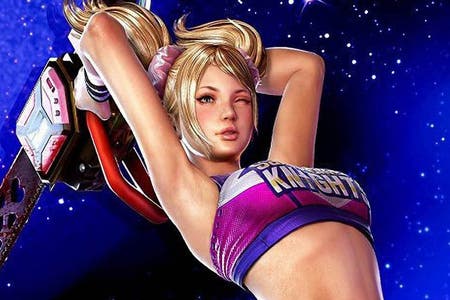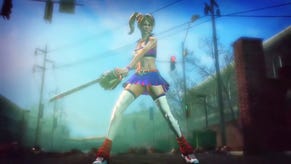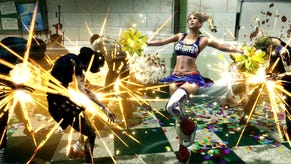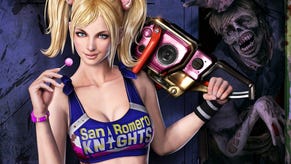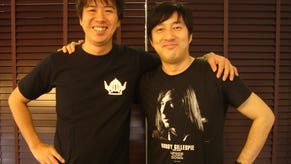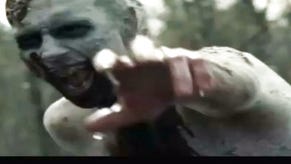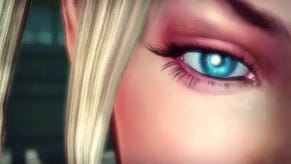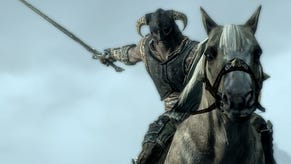Lollipop Chainsaw Preview: Suda's Teen Dreams
Surviving high school.
In 1994 a then unknown game director named Goichi Suda made a wrestling game called Super Fire Pro Wrestling: Special, wherein the protagonist commits suicide upon claiming his victory after realising how empty his life is. This refusal to adhere to conventions was simply the tip of the iceberg for what would end up being one of the boldest voices in Japanese gaming today.
His Killer 7 followed an elderly fellow who manifested his various personalities as a cabal of hitmen, No More Heroes saw the rise of an Otaku fanboy rising the ranks of an assassin's tournament so he could win the heart of a vapid French opportunist, and more recently Shadows of the Damned was a riff off the story of Orpheus with a whole lot of dick jokes. By his eclectic standards the upcoming Lollipop Chainsaw about a chainsaw wielding, zombie-slaying cheerleader is downright conventional.
When asked about its mainstream appeal Suda admitted that he wanted something "more accessible to a wider audience." Upon first glance Lollipop Chainsaw has consumerist Hot Topic fodder written all over it. It's hard not to feel pandered to when Juliet exclaims "This is great! I'm such a game geek!" upon being transported into an arcade game like Tron's Kevin Flynn, but on the surface, Juliet seems like a groan-worthy manic dream girl; all curves, catch phrases and kills.
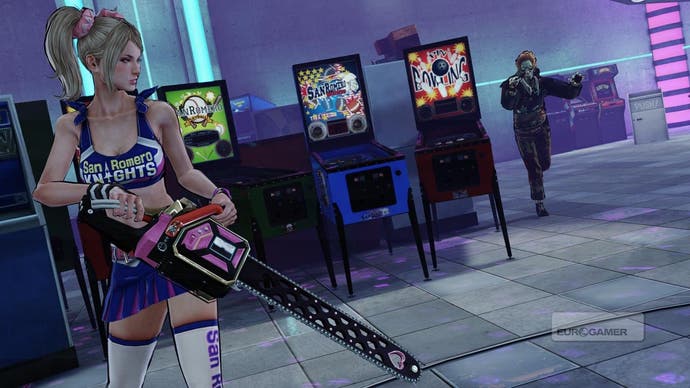
Yet, in spite of this tired trope, Lollipop Chainsaw finds its heart from a man who doesn't have one. Or most organs, for that matter. Juliet's boyfriend Nick just so happens to be a disembodied head. You see, after he was infected by a zombie Juliet had no choice but to lop his head off to save him, and thankfully she was able to magically keep him alive in this state. As Shadows of the Damned and Curse of Monkey Island before it proved, disembodied heads make great sidekicks.
Twisted as it may be, this bizarre relationship works. Lollipop Chainsaw's writer James Gunn (previously responsible for the twisted horror of Slither) describes the game as a love story that mixes the sweet and the profane. Much of Juliet's strength comes from her determination to take care of what's essentially an exaggerated quadriplegic boyfriend.
While this shows maturity, she's not above shallowly keeping her beau's person on her belt as a fashion accessory. This arrangement benefits Nick as well since not only is he not a zombie, but he has a cute girlfriend. Besides, it's not like he can afford to be choosy anyway. Juliet may be obnoxious at times, but there's a committed heroine in there.
Despite Juliet's blonde bimbo design, Suda sees her an ideal character. "She's charming, athletic, righteous, and has a lot of love for Nick. And she loves family. She's very strong. That would be like an ideal woman."
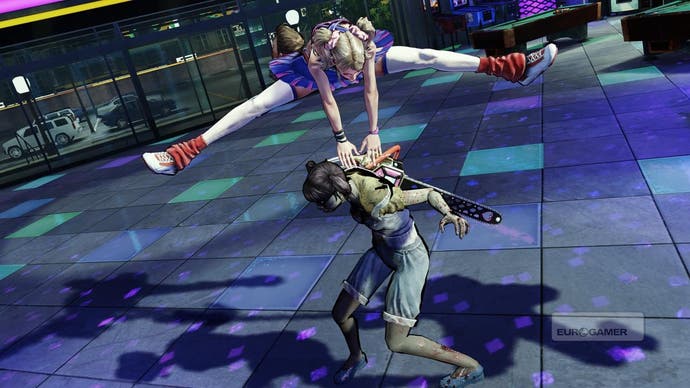
Gunn further describes Juliette as the "eternal optimist." Zombies running amok? It'll be okay. Sister captured? We'll save her, no problem. Boyfriend a decapitated head? Well, he still has a tongue -- something the bawdy script is fond of frequently pointing out.
While Juliet and Nick may have more to them than meets the eye, the core mechanics of shredding enemies with a chainsaw is at present worryingly rote. The most recent demo follows Juliet as she and Nick make their way up a building comprised of arcades and strip clubs in order to rescue Juliet's kidnapped sister, Rosaline.
The combat system has plenty of combos to purchase, but the advantages of different attacks are currently unclear. Chainsaw swipes don't feel powerful and you have to wail on enemies for an unusually long time before they'll fall. Enemies also have a tendency to knock you over every few seconds unless you're constantly dodging. After recent Grasshopper titles like Shadows of the Damned and No More Heroes 2, Lollipop Chainsaw feels especially scrappy.
As per Grasshopper's MO, there are plenty of throwbacks to 8-bit gaming. At one point Juliet gets absorbed into a neon variant of Pac-Man where she must run around a small maze from a top-down perspective while being pursued by blobs with giant mouths. Later there's an homage to Elevator Action where she ascends a 2D plane by finding doors in the background that take her to different parts of the level. Finally, there's a section where her digitized alter ego is climbing a building, shooting missiles at obstacles like falling cows and cars.
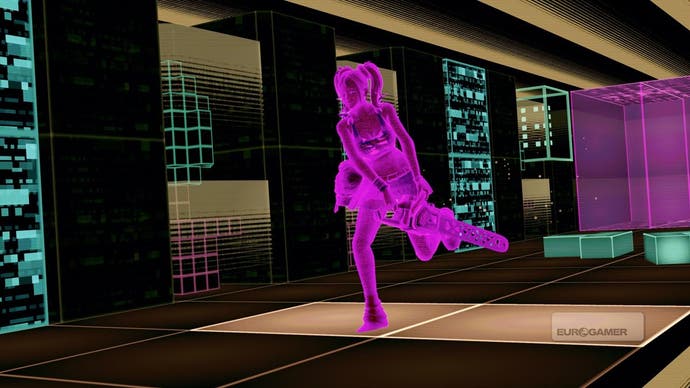
Where No More Heroes' retro bullet-hell mini-game, Pure White Giant Glastonbury, was a playable dream sequence, it's not entirely clear why these sections are portrayed the way they are. When asked about this Suda said, "My generation has always played those games. It's sort of a habitual game for Grasshopper. We're 8-bit lovers." This is as good a reason as any to toss them in here. More importantly, they break up the pacing, ensuring that each set piece feels unique.
Once Juliet reaches the roof of the building she encounters the boss of the stage; Josie, a pink-clad disco star with witch-doctor facepaint, riding a flying saucer with two scantily clad women forming a mini-harem around him. It's a peculiar hodgepodge of archetypes that hearkens back to Suda's more outlandish No More Heroes days.
While Lollipop Chainsaw may not be Suda's most refreshing work, it has a schlocky 80s charm to it. Suda cited Fast Times at Ridgemont High as an inspiration, and though I don't recall Jeff Spicoli fighting any zombies, it probably would have been more entertaining if he had. The goofy grindhouse vibe of Lollipop Chainsaw is far from grown-up, although I'm not sure who Juliet is supposed to appeal to besides pervy dudes.
Ostensibly cheerleaders aren't fans of obscure Japanese gory videogames, while the female audience may find the over-sexualized high-pitched ditzy portrayal embarrassing. Still, Suda games have always been more than they seem and his rambunctious adolescent spirit seems like a good fit for a slice of trashy high school Americana. Lollipop Chainsaw may not be his most grown-up work, but in this case his Peter Pan-like refusal to grow up is oddly endearing.
